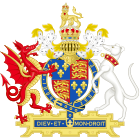The Suppression of Religious Houses Act 1535

|
|
| Long title | An Acte wherby all Relygeous Houses of Monkes Chanons and Nonnes whiche may not dyspend Manors Landes Tenementes & Heredycaments above the clere yerly Value of ij C Li are geven to the Kinges Highnes his Heires and Successours for ever. |
|---|---|
| Citation | 27 Hen 8 c 28 |
| Other legislation | |
| Repealed by |
Statute Law Revision Act 1948 Statute Law (Repeals) Act 1969 |
|
Status: Repealed
|
|
The Suppression of Religious Houses Act 1535 (27 Hen 8 c 28), also referred to as the Act for the Dissolution of the Lesser Monasteries and as the Dissolution of Lesser Monasteries Act, was an Act of the Parliament of England.
It was passed by the English Reformation Parliament of 1535/36. It was the beginning of the legal process by which King Henry VIII set about the Dissolution of the Monasteries. It was enacted in February 1535.
Sections 4 to 6 and 8 to 12 and 14 were repealed by section 1 of, and Schedule 1 to, the Statute Law Revision Act 1948.
Sections 17 and 18 were repealed by section 11 of 21 Jac 1 c 28.
The whole Act, so far as unrepealed, was repealed by section 1 of, and Part II of the Schedule to, the Statute Law (Repeals) Act 1969.
From the 14th century onwards, several popes had granted licenses for the suppression of religious houses in England. In 1528 Cardinal Wolsey sequestrated Rumburgh Priory for funds to build his college at Ipswich.
The breakdown of relations between Henry VIII and the Church in Rome, prompted by his marriage to Anne Boleyn, resulted in the Statute in Restraint of Appeals of 1533, forbidding all appeals to the Pope in Rome on religious or other matters.Pope Clement VII responded by announcing Henry's provisional excommunication, and the hostility between the king and the pope escalated. In the words of John Burton's Monasticon Eboracense (1758) –
The casting off the Pope's Supremacy, and the Monks being looked on only as a sort of half-subjects, ever ready to join any foreign power, which should invade the nation, whilst the King [Henry VIII] was excommunicated by the Pope... together with the [former] alienation of the lesser houses, were urged for seizing the rest; to which the King's want of a large supply, and the people's willingness to save their own pockets, greatly contributed; and accordingly, a motion shortly after was made in Parliament, that, to support the King's state, and supply his wants, all the religious houses might be conferred upon the Crown, which were not able to expend clearly above 200l. per annum. This Act passed about March, A. D. 1535.
...
Wikipedia
